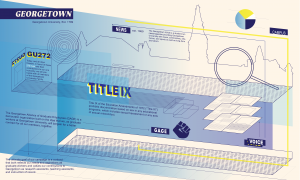Editor’s Note: After publication, GUSA provided the Voice with responses to this article. We have made any factual corrections they pointed out, but any differences in opinion have not been changed, given that this is an editorial representing the opinion of our editorial board.
Students have been talking about abolishing GUSA for so long that even GUSA is on board. The inefficient and elitist organization no longer serves the needs of the students. You should support abolishing and replacing GUSA; we do. In 2020, we called for an abolished Senate and reformed Executive. But it is exactly because GUSA’s Senate has been so out of touch with the student body that it cannot rush the process of finding a better option. The proposed draft constitution up for a vote on November 4-6 preserves what’s most ineffectual about GUSA while striking out what actually works. It’s not at all what students were promised last year.
In November 2020, GUSA Vice President Nicole Sanchez (SFS ‘22), while she was still a Senator, described her plan to restructure GUSA to the Voice. The proposed change included abolishing the ineffective Senate and replacing it with expanded student policy teams within the GUSA executive’s framework. Hypothetically, these policy teams would address work for specific goals or advocacy objectives such as a housing stability or racial justice committee. Instead of each class electing a slate of candidates who represent students’ interests as one small voice in the senate, candidates would run for these specific policy chairs, eliminating many appointed positions with GUSA. These changes would work to root out elitism and legislative red-tape that hindered real advocacy. Specialized policy chair positions could revitalize the advocacy that GUSA does by including student leaders who have considerable experience, expertise, and connections in the field.
GUSA’s newest referendum, which passed in the Senate in mid-October, is advertised as doing the same. Its series of clever rebrandings, however, cloak an unjustifiable prolonging of the Senate’s role in student life.
This editorial board has pored over the new constitution and found it to be a rushed document that reproduces GUSA’s biggest problems, creates new electoral and structural issues, and stops short of making the big changes that the organization needs. Vote no; send it back until GUSA gives us a real, fully-thought-out plan. If this means the true “Abolish GUSA” referendum should be delayed until next semester, so be it. The price of getting this wrong is too high.
Electoral Problems Would Lead to Advocacy Failures
In contrast to previous promises, this draft constitution both retains general elections and increases the number of at least semi-appointed positions rather than creating specialized policy chair elections for the new Assembly. The new constitution continues these elections through omission of any specific election processes. Yet-to-be-drafted bylaws would determine the number of elected students, which committees exist, and how elections work, but would be drafted only if the referendum succeeds.
Historically, GUSA Senate has held the reputation of attracting power and prestige-hungry students, rather than those passionate about concrete advocacy work. Because of the insignificance or inefficiency of GUSA senators, many undergraduates simply do not care about GUSA. The last Senate election in May 2021 had a dismal 16.9% turnout. Unless more changes are made, the future Assembly would likely consist of similarly self-interested student representatives, ensuring continued dysfunction. In addition to elitism, many past GUSA senators have portrayed explicit and harmful racism and sexism both inside and outside of the organization.
One of the most problematic aspects of the new constitution is the creation of a consolidated “Secretary of the Assembly,” replacing GUSA’s current President, Vice-President, and Speaker of the Senate with a single position. They would be elected through a special process in which candidates opt to run specifically for Secretary. However, the process as detailed in the referendum text is so opaque that no member of this editorial board could definitively judge how it is really supposed to work.
While the Secretary would have the same voting power as other members, under the referendum plan, they are the “primary representative in external meetings,” responsible for communications. As it stands, the Secretary would be required to take shockingly little accountability for how they influence the appointment of chairships, with little input from the general student body besides the non-Assembly members on the ill-defined “Administrative Committee.” This lack of accountability could result in politicking among Assembly members for policy chairships, as well as the formation of factions or cliques.
Under this system, GUSA would remain inefficient in its advocacy while maintaining its elitist status quo. The same type of students who run for GUSA Senate now are likely to continue running: the occurrence of elections on a general class level removes any incentive for candidates to specialize in a specific policy area—each candidate knows they will be appointed into a policy committee either way. There is an incongruence between what students are elected for and what they will do. Class-specific candidates are elected to represent their class generally, but are charged with leading a specific policy committee, often advocating for one specific part of the community.
The draft constitution’s lack of electoral clarity dilutes its alleged (and much-advertised) strengthened focus on policy teams. It’s not necessarily bad to have a dynamic committee structure in which the number of policy committees and their responsibilities change yearly, as is outlined in this new constitution. But the constitution tosses the actual processes of institutional transformation to its updated bylaws — which don’t exist even in draft form. Students don’t know what policy teams would be created, what processes exist for making new policy teams or collapsing old ones, or what would happen to existing policy committees during a transition period next semester. These plans are so unclear to students because there are no plans; policy-inexperienced assembly members control the whole process.
If this new constitution were adopted, the same election structure that currently discourages many student advocacy leaders from running for GUSA will remain in place. Candidates may advocate for disabled students, for example, but may not be elected by the general, majority non-disabled population. On the other hand, disabled students on campus may not feel represented by an appointed able-bodied GUSA disability policy chair.
Moreover, since all Assembly members are supposed to be committee chairs, committees of vital importance could end up chaired by students with views fundamentally incompatible with the purposes of their committees. For example, a communications committee chaired by an elected student who fosters negative views towards marginalized communities may not support a progressive student chairing a LGTBQ+ advocacy or racial justice committee. Imagine if a student who opposed the GU272 referendum were in charge of disseminating information about it. In this scenario, GUSA’s own structure would get in the way of effective advocacy.
The new constitution is too vague for us to be able to endorse it in good will. We agree that the number of elected students and committees needs to remain dynamic, but other aspects, like how elections would work, need to be defined far more clearly. The student body should not have to vote for the possibility of a better system without actually knowing what that system would be — any democratic referendum must be clear about what a new government would look like.
Structural Issues Would Perpetuate Irresponsible Governance
Even with increased clarity, however, the new organization fails to account for several structural flaws.
The proposed Assembly’s structure threatens to overburden the Secretary and increase the potential for nepotism within GUSA. First, the editorial board suspects that the Secretary’s responsibilities—which, as mentioned, combine those of three current positions—would be too much for one person to handle. Even if the Secretary delegated work to Assembly members, they may ask their friends, rather than those most qualified, to do the most important tasks. We need more transparency in this student government, not less.
The Assembly’s structure is also ripe for conflicts of interest. How can Assembly members ethically and responsibly balance leading and serving the needs of policy committees while allocating funding to organizations around campus? How can students hold Assembly members accountable for irresponsible behavior when Assembly members will also comprise many of the seats on the proposed Ethics and Oversight Committee? In this draft constitution, the Assembly places too few restraints on their own powers.
The fact that the draft constitution keeps the Finance and Appropriations Committee (FinApp) under the Assembly’s control is the worst of these potential ethics violations. FinApp has historically remained under the thumbs of GUSA’s more conservative interests, whose austerity politics have denied student organizations funding: in April 2021, GUSA gave itself a 43% raise in funding while cutting funding to the Center for Social Justice Advisory Board of Student Organizations (known as ABSO). While the Student Activities Commission received a 4% raise in April, their funding had been cut 17% the previous year. GUSA might need the funds it asks for, but so do other student interests it claims to represent. (Full disclosure: the Voice and other campus media groups have been negatively impacted by previous FinApp budget allocations.) Nevertheless, the recent informational powerpoint the Voice received from GUSA about this referendum includes a FinApp slide that says “there’s nothing wrong with it.”
Student leaders have done better before. For example, months of student input and consistent publicity legitimized the detailed GU272 referendum. This referendum, on the other hand, was made so hastily that few students know the actual contents of the amended constitution, let alone the specifics of the Assembly’s governance.
This referendum process is so rushed that GUSA’s instagram page put out its first advertisements about the referendum on October 18 — barely three weeks before the vote. The Editorial Board isn’t confident that such huge changes to student government should be made with so little time for public debate. But we do believe that change needs to happen.
Students Deserve Real GUSA Abolition—Here’s What It Could Look Like
We endorsed the Blass-Sanchez ticket with enthusiasm and optimism due to its detailed policy objectives, chief among them their cohesive vision to restructure GUSA “towards a student unionship.” This restructuring was predicted to require a few key objectives: completely abolishing the Senate, changing subcommittee chairs to be elected by policy areas, eliminating many appointed positions, and clarifying roles within the executive. These goals aimed to make GUSA far more accessible and efficient, and we still wholly support them.
The plan described above is something that this editorial board could get behind, but the upcoming referendum in its current form gives GUSA a structure far different from—and far worse than—what students have been promised. GUSA can do better.
A new draft constitution should entirely abolish the Senate, not only in name, but in function. A reformed GUSA should entrust student advocacy to qualified committee members who report directly to the executive branch. Moreover, the referendum’s sponsors state that the Assembly would hold assemblies only 3 times a term (bylaws could increase this number, but they don’t exist yet). This could limit student input from outside of the organization. A future referendum should create a GUSA with a town hall-like structure in which GUSA committee and executive members regularly engage with the public.
While the Senate should go, we think GUSA’s executive branch should remain in place, albeit with changes to increase efficiency and flexibility. While executive authority freed from a Congress can be scorned as “undemocratic,” we reemphasize the fact that the premise behind GUSA reform is to move the organization away from being an ineffective government. There’s no point romanticizing the merits of a bloated and biased “democratic” system for a student union by removing an aspect of GUSA crucial to its effectiveness.
Indeed, the Blass-Sanchez Administration and their predecessors have delivered impressive results to students in need. The executive demanded improvements to financial aid practices earlier this year, leading to more effective allocation of the CARES Act. Their active opposition to the relocation of the GSP office and work with the administration to revise meal plan requirements in the aftermath of the norovirus outbreak effectively elevated student voices and led to administrative action. The Executive functions; the Senate doesn’t.
A reformed executive could consist of an elected equivalent to a president and vice president who solicit advocates from the student body to chair policy committees through a well-regulated process designed to avoid favoritism. Students could even directly elect policy chairs to work under that executive.
The referendum should also include a complete overhaul of the deeply flawed FinApp process. To prevent austerity politics from interfering with club operations and a more equitable distribution of funding, an independent commission consisting of non-GUSA students should be responsible for budget allocations; a GUSA-affiliated chair of any future non-GUSA budgeting group can facilitate student government involvement in the process. Student organizations should also be better able to hold FinApp accountable for their repeated failures to understand their needs.
The process by which GUSA conducts this reform should also be reconsidered. A change of this magnitude merits months of open dialogue between GUSA and members of the public before being put to a vote. Input on the new constitution must also come from beyond just GUSA and their inner circle of contacts. The product should be precisely worded, truly representative of the needs of our student body, and complete with by-laws that maximize transparency.
While we sympathize with the need for immediate reform, a hasty GUSA overhaul conducted without a clear framework serves us no better than the current GUSA bureaucracy. It may even hinder future attempts to correct this draft constitution’s excesses if Assembly members can claim that they have successfully “abolished” the bureaucratic nature of GUSA—even when the new constitution falls severely short of that.
Becoming a true student union is a long overdue change for GUSA; however, this process must be done right. A reformed GUSA needs to place the people best equipped to make substantive change in positions where they are equipped with the mandate to do so. This requires a sound, nimble governing structure devised from significantly more outreach, clarity, and deliberation on their part.
Should we abolish GUSA? Yes, but let’s do it properly.
This editorial has been updated to reflect additional information about the specifics of GUSA’s proposal.





